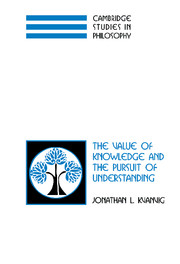Book contents
- Frontmatter
- Contents
- Introduction
- 1 The Value of Knowledge Is External to It
- 2 The Value of True Belief
- 3 The Value of Justification
- 4 Reliabilism, Normativity, and the Special Promise of Virtue Epistemology
- 5 The Gettier Problem and the Value of Knowledge
- 6 Knowledge as Irreducibly Valuable
- 7 Epistemic Attitudinalism: Semantic and Pragmatic Approaches
- 8 Knowledge and Understanding
- 9 Conclusion
- References
- Index
5 - The Gettier Problem and the Value of Knowledge
Published online by Cambridge University Press: 14 August 2009
- Frontmatter
- Contents
- Introduction
- 1 The Value of Knowledge Is External to It
- 2 The Value of True Belief
- 3 The Value of Justification
- 4 Reliabilism, Normativity, and the Special Promise of Virtue Epistemology
- 5 The Gettier Problem and the Value of Knowledge
- 6 Knowledge as Irreducibly Valuable
- 7 Epistemic Attitudinalism: Semantic and Pragmatic Approaches
- 8 Knowledge and Understanding
- 9 Conclusion
- References
- Index
Summary
The topic for this chapter arises out of two sources. In the previous two chapters, we discovered two properties of belief that are valuable beyond that of truth, the properties of subjective justification and intellectual virtuousity. Both of these properties are valuable by themselves, so that it is epistemically better for a belief to be subjectively justified than not and it is better for a belief to be virtuous than not. Moreover, these properties have a value not swamped by the presence of truth, so that it is better to have a subjectively justified true belief than one that is true but unjustified in this sense, and it is better to have a virtuous true belief than to have a true belief that is not virtuous. In the former case, what makes the property of subjective justification valuable in a way not swamped by the value of truth is that this property is a transparent mark of truth. So it has value because of its connection to truth, but its value is not swamped by the presence of truth, as are other properties such as reliability that also have value because of their connection to truth. Intellectually virtuous belief is valuable because when a belief has this property, the believer is due credit for having a true belief.
- Type
- Chapter
- Information
- The Value of Knowledge and the Pursuit of Understanding , pp. 108 - 139Publisher: Cambridge University PressPrint publication year: 2003



